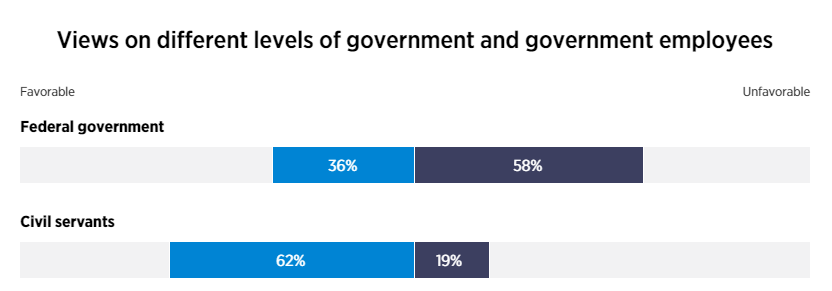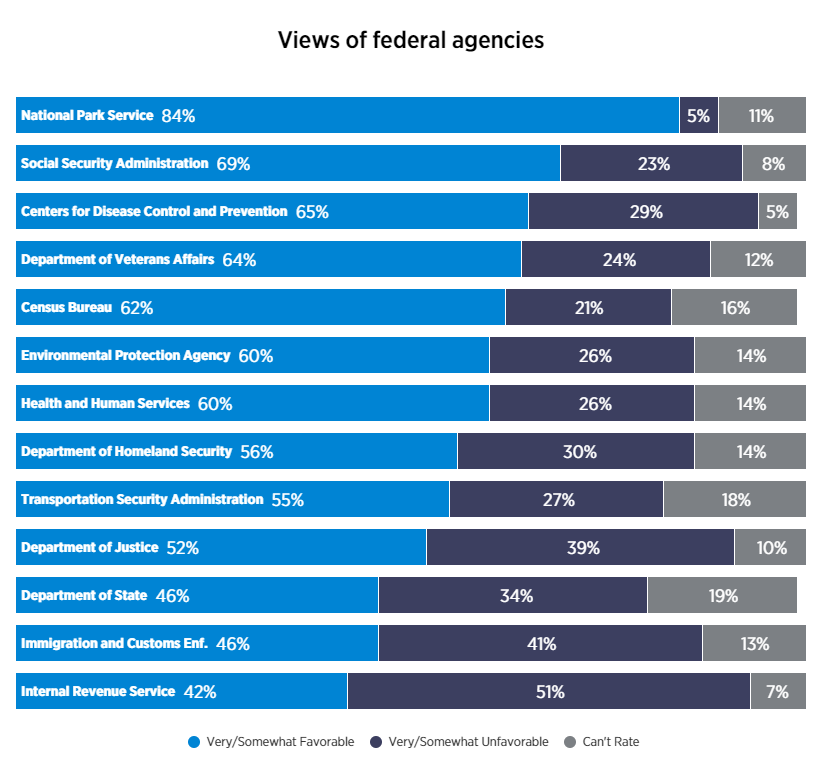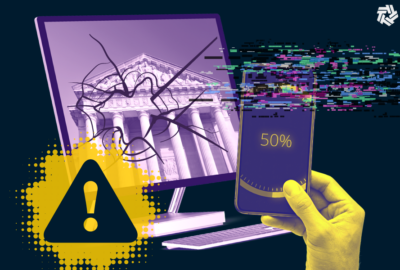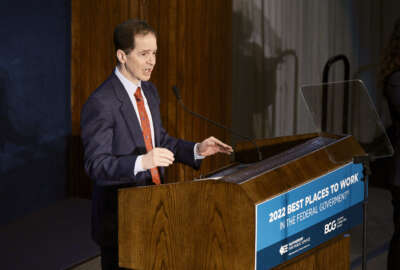Focusing on civil servants, customer experience may lead to better trust in government
Only 35% of Americans said they trust the federal government, but highlighting the work of civil servants can pave the way to more positive views, the Partnersh...
The public’s low trust in the federal government hasn’t budged much at all in the last year, and in fact, it may be eroding even further.
Only 35% of Americans said they trust the government, the Partnership for Public Service found in its latest round of research, published earlier this month.
The data, housed in a new dashboard, showed that low levels of trust remained largely the same from the organization’s research last year, if not taking even more of a hit. In 2022, 40% of respondents said they trust the government to do what is right.
Consistently low trust has negative effects on agencies’ ability to meet their missions — and it’s something that can worsen over time.
“When people have low levels of trust, they’re less likely to listen to guidelines or recommendations, or heed warnings from the government,” said Paul Hitlin, a senior manager at the Partnership, during an Aug. 3 webinar.
Low trust has some less expected influences on agencies as well. It can lead to poor recruitment of younger employees, who on average trust the government even less. Just 30% of those between ages 18 and 34 said they trust the government, the Partnership found in its latest research. That’s compared to 42% of individuals ages 65 and up.
“When people are not as trusting of the government, it makes it a little less attractive for people to go work for the government,” Hitlin said.
And trust in government, in part, drives the cycle of resources and funding for agencies.
“In order for the government to continue to reform and improve itself, which it should be doing constantly, it needs resources, time and support,” Hitlin said. “When people trust the government less, they’re less likely to support giving more resources to the government.”
But the Partnership said there are a few avenues to take, to try to bridge the gap to better trust. It all depends on the focus. Congress has a much less favorable view from respondents in the Partnership’s research. On the other hand, focusing on the role of civil servants, who receive more positive views, can pave the way to better trust overall.
“What we found through some of our anecdotal work and some focus groups is that telling people personal stories about federal workers, particularly federal workers who are doing really great and important work, seems to get a really strong reaction,” Hitlin said. “We think it’s really important that agencies focus on communicating what their mission is, and why they’re doing the work they’re doing — really talk about the big picture and how it impacts people.”

57% of respondents said federal employees were competent and 52% agreed that federal employees are hard workers.
“Civil servants are generally seen positively by 62% of our respondents,” said Nadzeya Shutava, a senior manager at the Partnership. “And far more Americans also agree that civil servants are doing public service.”
More positive results also shine through when breaking the Partnership’s results down by agency. The National Park Service received the highest scores of trust, with 84% of respondents having a favorable view of the agency. The Social Security Administration ranked just below NPS, with 69% of respondents viewing the agency favorably. IRS received the lowest marks of the agencies the Partnership surveyed.

Customer experience is another a big driver of trust, and targeting improvements in delivering services to the public can lead to more positive views. Close to two-thirds of those who have positive experiences with government said they trust it too, while about a third said they do not, the Partnership found.
“How we view customer experience is very important in our organization, and it’s generally considered a factor in how much people trust the federal government,” Shutava said. “We view this as one of those positive trends that we were really eager to uncover in the general topic of public trust in government.”
Some agencies received strong marks when it came to their specific services to the public. Despite more recent passport delays, the Partnership’s data showed that 88% of those who applied for a passport, a function of the State Department, were satisfied with their experience. And 74% of respondents said they had a positive experience when signing up for an account on a government website.
But there is a catch. Negative experiences with federal services have a stronger influence on public trust than positive ones. About 85% of those who have negative overall experiences with government said they distrust it, while only 14% expressed trust.
“These numbers show that while positive customer experiences can help drive trust in government, they are not the be-all and end-all. Many people who have positive experiences with government still distrust it and negative customer experiences seem to drive skepticism of federal institutions more forcefully,” Elizabeth Byers, an associate manager at the Partnership, said in a July blog post. “So while efforts to improve the federal customer experience may prevent a further decrease of trust in government, we cannot definitively say that CX initiatives alone will drive significant and lasting increases in public trust in government.”
Copyright © 2024 Federal News Network. All rights reserved. This website is not intended for users located within the European Economic Area.
Drew Friedman is a workforce, pay and benefits reporter for Federal News Network.
Follow @dfriedmanWFED






